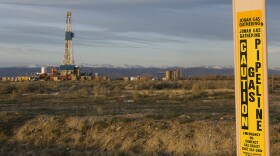Michigan House Republicans are renewing an effort to count around a dozen Upper Peninsula natural gas generators as clean energy.
Without the policy change, the reciprocating internal combustion engines, or RICE generators, would have to go offline or cancel out their greenhouse gas emissions by 2040.
That’s because of a state law requiring a complete clean energy transition by then.
State Representative Karl Bohnak (R-Deerton) sponsors the legislation. He said renewable energy sources wouldn’t be able to replace the energy production of the gas generators.

Rep. Prestin (right) and Rep. Bohnak discuss RICE generator legislation on January 15, 2025.
“If we were to build out these solar and wind, there would be much less. And we have to use huge amounts of land, hundreds of thousands of acres for solar. And just think about all the roads we have to construct and so on and so forth, how much that would cost,” Bohnak said Wednesday.
A concern with the 13 RICE generators is how new they are. They were built within the last 10 years to replace coal plants in the U.P. The natural gas generators emit less greenhouse gases than the coal plants, but they still burn fossil fuels and contribute to climate change.
Representative David Prestin (R-Cedar River) said ratepayers will be covering the costs for the gas generators until 2049. He’s doubtful renewable energy could provide enough power for the U.P.
“They’re bonded out till then. So, we're going to be paying on two sources of generation. And at the end of the day, it doesn't work. If they don't stay running, we go darker. We become reliant on Wisconsin transmission,” Prestin said.
When the state Legislature rewrote Michigan's energy laws in 2023, Prestin and other Northern Michigan lawmakers unsuccessfully tried to create a carve-out for the generators. The law did leave some exceptions for fossil fuel plants, including ones using carbon-capture or removal technology.
But it doesn’t look like the RICE generator exception is going to get much support from Democrats in the House minority.
“Michigan is on track for a healthier future thanks to the Clean Energy and Jobs Act we passed in 2023, and we’re already seeing the jobs and tax revenue that go along with transformative infrastructure investments. Any proposal that cuts the U.P. off from the economic and health benefits of green energy doesn’t make sense,” House Minority Leader Ranjeev Puri (D-Canton) and House Democratic Floor Leader John Fitzgerald (D-Wyoming) said in a joint written statement.








